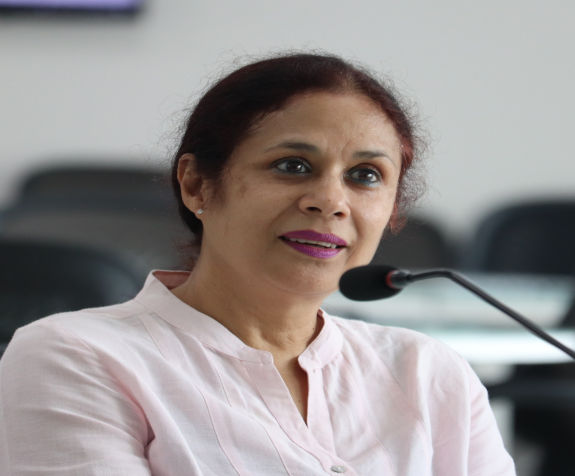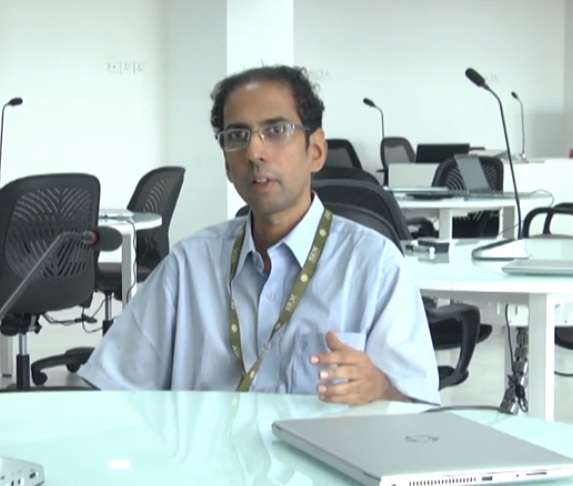The curriculum is comprised of 6 Foundation Courses (FC), 8 Departmental Core Courses (DC), Departmental Elective Courses (DE), and 2 Allied Department Courses (AD). While the FC and the AD courses are meant to broaden a student’s interests and general knowledge and improve upon their critical thinking skills, the DC and DE courses take a deep dive within a particular discipline so that the graduating student is well trained in the subject matter. It is our intent and expectation that the knowledge base and the method of enquiry encouraged in the FC trains students to become global citizens and thought leaders in their respective fields. On the other hand, the DC and DE maximize the potential of students to secure rewarding jobs.
The foundation courses (FC) are compulsory for all students in the SLABS program and are meant to ignite the student’s general knowledge and interest in a wide range of courses that are described in greater detail below. The manner in which these courses are “taught” will represent a clear departure from the traditional monologue delivered from the teacher to the student. In these FC’s, the Professor’s role is to initiate a discussion among students, eliciting their views on specific questions, and encouraging open and engaged debate about the issues and questions raised by the assigned texts. The ultimate purpose of these courses is to broaden a student’s perspective thereby allowing him/her to view any issue or topic with an unbiased mindset- a quality that is central to becoming a leader and an intellectual in today’s fragmented, divisive world.
The DC comprises the cog in every discipline. Our courses are chosen so as to maximize the probability that a graduating student can be competitive in his/her career. Our engine here is the top-notch faculty who are very well trained in their own discipline.
The DE courses are chosen carefully so as have maximum relevance for our students. For example, the traditional economics/BBA programs will include courses that delve deeply into an analysis of demand and supply of commodities. In today’s world, many demand and supply transactions are performed online—when was the last time you went to a store and bought a product? We therefore explicitly introduce a course titled “E-commerce and Economics” to take into account the current scenario.
The AD courses are meant to cater to each student’s interests. Most of us choose a major because we have to choose one—not because it is the only subject that excites us. The AD courses are meant to allow students to take courses outside of their core major. This, in many instances, is quite natural. A student in mathematics may be genuinely interested in a course in computer science; an economics major may want to take a couple of courses in mathematics or psychology; a history major may want to consider a course in economics. Each student is allowed to take 2 courses each in 2 subjects outside their core.
Below we provide a description of our six foundation courses- the hallmark of our SLABS curriculum. We reiterate that the purpose of these FC’s is to train students to become thought leaders in their respective careers. Too often we find that our societies are fractured because of our inability to elevate ourselves above personal biases. In particular, the intent is to allow a student to treat any issue or question in an unbiased manner—thereby maximizing the chances of making a real-difference in society.
1. IDEA OF INDIA
The Indian subcontinent (today the home of Bangladesh, Pakistan, India, Sri Lanka, Nepal and Bhutan) is often imagined as an exceptional and timeless space and place: home to a dizzying array of ancient philosophical traditions; spiritual and physical inquiry; long-standing traditions in art, literature, architecture, aesthetics, music and dance. In this course, we will take a rapid jaunt through this dizzying land in its past and present, and through all its manifold contradictions, from the sublime heights of abstract philosophy to the brutal realities of postcolonial poverty; from the masterpieces of art and architecture to the teeming cities of the subcontinent; from the epics represented in its traditions of dance and music to its contemporary obsession with Bollywood and cricket, that Indian game accidentally birthed in Britain. Our inquiries will be driven by a single question that is of relevance to every inhabitant of the south Asian subcontinent and many others beyond it: how do we reconcile the land’s millennia of civilization with the difficulties of its present?
2. GREAT BOOKS AND GREAT DISCOVERIES
Over the past several centuries and across civilizations, the world has borne witness to great thinkers and philosophers. Some of these intellectual giants have penned their thoughts and logic on paper and the result has been a multitude of “great” books. Who or what makes them “Great” and for whom and for what purpose? Why read “the Great Books”? Other brilliant thinkers have pondered fundamental questions about our natural environment- a process that ultimately resulted in scientific discoveries that have led to seismic shifts in our understanding of the world we inhabit. The great scientists were in many respects philosophers grappling with major philosophical and natural questions and the course includes readings by philosopher scientists such as Galileo, Darwin and Newton.
The great books provide an illustration of some of the questions that philosophers have tackled over millenia and with which we continue to grapple. How should communities be organized? What is good and evil? Right and wrong? What are the means necessary to produce good societies? What does “doing one’s duty” mean? Should scientific knowledge dictate our moral and political order? In this course, we will discuss how we might interpret these “texts”? What is the relationship between the “texts” and their own historical context? Most importantly, what is the relationship between our social, cultural and intellectual presents to our interpretation of these texts? We will approach these texts with an intellectual openness – first by attempting to “see things their way” and next by tracing the meanings such texts can provoke in various historical presents. This will help us avoid the trap that these texts form a singular set of meanings or values about our present and guide us away from any hegemonic accounts of the texts.
3. COMMUNICATIVE ENGLISH
Communicative English is a Foundation Course (FC) designed to help students learn the principles and practices of public speaking and writing. This course guides students through a series of speaking and writing activities to enhance their pronunciation, grammar and knowledge of rhetorical skills. The course objectives are for students to demonstrate an understanding of the value of rhetorical speaking skills; Paraphrase and cite research correctly; write and speak well-developed, clear, unified ideas with appropriate college-level language choices; Demonstrate a growing understanding of critical thinking in speaking, writing and in public situations. The class also provides students with insights into the fundamentals of persuasion.
4. WHY READ A BOOK
Why Read A Book? is a Foundation Course (FC) tailored to help students acquire and develop a love of reading and an understanding of how to read and analyze texts. Students will be reading short excerpts from influential writers in different historical eras and across a range of genres, from poetry to essays, news stories, screen plays, scholarly articles and opinion-editorials. The goal is for students to learn how an author writes with a creative purpose to a specific audience while using rhetorical skills within a historical context. Students are required to complete assignments that help them learn basic academic reading and writing strategies with the goal of developing life-long skills in these areas. Why Read A Book? - to learn the joy of sharing ideas, stories and experiences.
5. ENVIRONMENTAL STUDIES
Environmental Studies is a Foundation Course (FC) that is meant to stimulate interest in questions about the natural environment. We trace how science and technology has resulted in a better understanding about the “rules” of the environment, but also how unfettered use of this knowledge has resulted in adverse impacts to the environment. This broad sweep then sets the stage for a more focused discussion on the environmental challenges facing the present generation, the political economy that influences the ability to confront these challenges, and the potential channels via which government policy can impact the environment.
6. DATA SCIENCE AND BIG DATA
This Foundation Course (FC) is a course about how we might learn from data. At its core, data are speaking to us. Using the fundamentals of statistics and the computing ability afforded by computers, this course takes us through examples of real world data and illustrates the role of data science in unearthing some fundamental insights from the data. At the end of this course, students should be able to, (a) Build their own movie, music, and product recommendation system, just like Netflix, (b) Use network-theoretic ideas to identify new candidate genes that might cause autism, (c) Predict wages with a linear regression model. The goal of this course is to get students excited about using data in ways that are meaningful and exciting from both a personal and societal perspective.
Click here to view the detailed curriculum of all programs.




